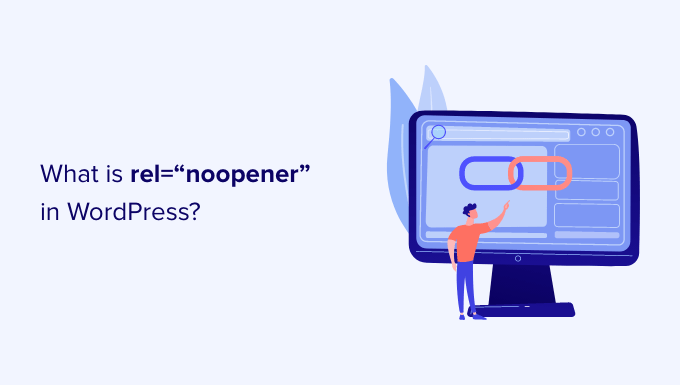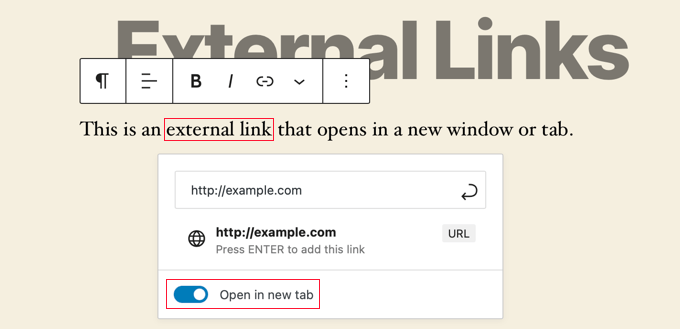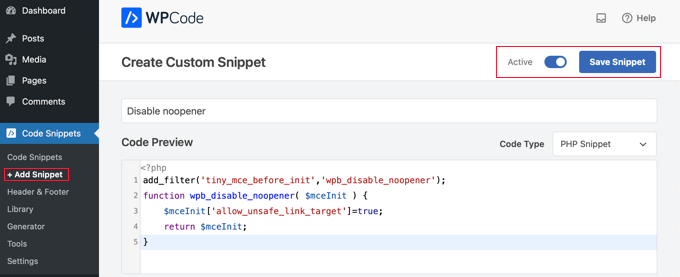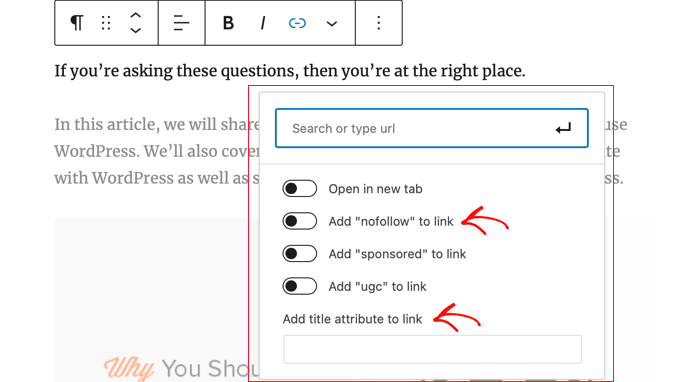Have you been wondering what rel="noopener" means in WordPress?
When you add a link that opens in a new tab, WordPress will automatically add the rel="noopener" attribute to that link.
In this article, we will explain what rel="noopener" means in WordPress and how it affects your website.

What Is rel=”noopener” in WordPress?
When you add links to your WordPress website, you can use HTML attributes to control what happens when you click the link.
For example, when you create a link, there is a toggle switch that allows you to open it in a new tab.

The HTML code generated by WordPress for this link looks like this:
<a href="http://example.com" target="_blank" rel="noreferrer noopener">external link</a>
Notice that some HTML attributes have been added to the link: rel="noopener" and rel="noreferrer". These attributes are added to address a security vulnerability.
The problem is that JavaScript code can be used to allow a new tab to get control of its referring window. If you link to an external website affected by the malicious code, then that website can use the window.opener property in JavaScript to change the original web page (on your WordPress site) to steal information and spread malicious code.
WordPress adds rel="noopener" to prevent the new tab from taking advantage of this JavaScript feature. Similarly, the rel="noreferrer" attribute prevents passing the referrer information onto the new tab.
How Does rel=”noopener” Affect Your WordPress SEO?
It doesn’t.
Even though the rel="noopener" attribute improves your WordPress site’s security, some users avoid using it because they think it will impact their WordPress SEO.
But that’s just a myth.
It has no impact on your site’s SEO rankings or your overall WordPress performance.
What’s the Difference Between “noopener” and “nofollow”?
It’s easy to confuse rel="noopener" with rel="nofollow". However, they are completely separate attributes.
The noopener attribute prevents your website from cross-site hacking and improves WordPress security.
On the other hand, the nofollow attribute prevents your website from passing on SEO link juice to the linked website.
Search engines look for and consider the nofollow attribute when following a link on your website. However, they do not give any consideration to the noopener tag.
By default, WordPress does not allow you to add nofollow to your external links. If you want to add nofollow in WordPress, then you will need to use a plugin.
To learn more, see our article on how to add title and nofollow to links in WordPress.
Does rel=”noreferrer” Affect Affiliate Links in WordPress?
The rel="noreferrer" does not affect affiliate links in WordPress. Some users believe that it does because rel="noreferrer" prevents the referrer information from passing to the new tab.
However, most affiliate programs provide you with a unique URL that has your affiliate ID. This means your affiliate ID is passed along as a URL parameter for the other website to track.
Secondly, most affiliate marketers use a link-cloaking plugin for their affiliate links.
With link cloaking, the affiliate link that your users click on is actually your website’s own URL, which then redirects users to the destination URL.
How Do You Disable rel=”noopener” in WordPress?
There is no need to remove rel="noopener" from links on your website. It is good for your website’s security and has no performance or SEO impact on your website.
However, if you must remove it, then you will have to disable the Gutenberg block editor in WordPress and use the classic editor.
That’s because if you remove rel="noopener" from the link manually, the block editor will automatically add it back in to keep your website safe.
Once the block editor is disabled, you will need to add a code snippet to your theme’s functions.php file or to the WPCode plugin (recommended). You can learn how to use the WPCode Free Plugin in our guide on how to easily add custom code in WordPress.
Simply copy the following code into a new PHP snippet:
add_filter('tiny_mce_before_init','wpb_disable_noopener');
function wpb_disable_noopener( $mceInit ) {
$mceInit['allow_unsafe_link_target']=true;
return $mceInit;
}

Make sure you turn the ‘Active’ toggle on and then click the ‘Save Snippet’ button.
This will stop WordPress from adding rel="noopener" to new links. You will also need to manually edit any old links to remove the attribute.
Want even more control over which rel attributes get added to your links in WordPress? We recommend using the AIOSEO plugin because it lets you add title, nofollow, and other link attributes right inside the WordPress editor.

Expert Guides on Using Links in WordPress
Now that you understand what rel="noopener" means, you may like to see our other guides on how to use links in WordPress.
- Beginner’s Guide on How to Add a Link in WordPress
- How to Open External Links in a New Window or Tab with WordPress
- How to Add Nofollow Links in WordPress (Simple Guide for Beginners)
- How to Add Title and NoFollow to Insert Link Popup in WordPress
- How to Nofollow All External Links in WordPress
- How to Track Link Clicks and Button Clicks in WordPress (Easy Way)
- How to Track Outbound Links in WordPress
- How to Change the Link Color in WordPress (Beginner’s Guide)
- Internal Linking for SEO: The Ultimate Guide of Best Practices
- How to Preload Links in WordPress for Faster Loading Speeds
- How to Find and Fix Broken Links in WordPress (Step by Step)
- Best Internal Linking Plugins for WordPress (Automatic + Manual)
We hope this article helped you learn about rel="noopener" in WordPress. You may also want to see our guide on how to get a free email domain, or our expert picks for the best WordPress SEO plugins and tools.
If you liked this article, then please subscribe to our YouTube Channel for WordPress video tutorials. You can also find us on Twitter and Facebook.





Syed Balkhi says
Hey WPBeginner readers,
Did you know you can win exciting prizes by commenting on WPBeginner?
Every month, our top blog commenters will win HUGE rewards, including premium WordPress plugin licenses and cash prizes.
You can get more details about the contest from here.
Start sharing your thoughts below to stand a chance to win!
Moinuddin Waheed says
This is very helpful guide for me as I have been teaching html and css to my students and this for have not talked about these two attributes. Most of the teachers only bother to tell target equals blank attribute for opening link in new tabs.
The best part is that we have all these options at our end in wordpress as well.
noopener is good for security reasons as it protects from cross site hacking.
Thanks for this detailed tutorial.
WPBeginner Support says
Glad we could share this
Admin
Oleg Bibik says
Great info, thanks. I now know the difference between noopener and nofollow.
WPBeginner Support says
Glad we could help clear that up
Admin
April says
The noopener is also present with the WordPress Classic editor.
WPBeginner Support says
True, we cover the block editor as that is the default editor for WordPress.
Admin
Maria says
Is that ok If i am using “noopener & Noreferrer” for interlinking?
WPBeginner Support says
You normally shouldn’t add that for internal links but you can if you would like.
Admin
Navneet Kumar says
Can we say rel=”noopener no referrer ” provide dofollow backlink to external website?
I mean if we receive this attribute then we received dofollow backlinks or nofollow backlinks?
Thanks in advance
WPBeginner Support says
These attributes would not affect if a link is dofollow or nofollow, that would be determined if the link is nofollow or not.
Admin
Nadya says
is it ok to use rel=”noopener noreferrer nofollow” in any position?
like
rel=”nofollow noopener noreferrer”
rel=”noreferrer nofollow noopener”
WPBeginner Support says
You shouldn’t need to worry about the order
Admin
Ryan says
Thank you for your article.
I checked my website on web.dev, and I was confused what is noopener and noreferrer.
After I put it to all of link with target=”_blank”, my best practice score went from <80 to 86.
Thank you.
WPBeginner Support says
Glad our guide could help, don’t forget that sites with scores like that are mainly suggestions
Admin
Jill says
Hello,
What about the custom templates used in WordPress? Should rel=”noopener” be used in the links in the custom posts templates? Especially, internal linking?
WPBeginner Support says
You would not need to worry about noopener in the links to the templates for your posts and custom post types.
Admin
Graham says
does this affect Analytics? Yes or no?
WPBeginner Support says
noreferrer will prevent Google Analytics from tracking the site that the link came from.
Admin
Lory says
Can we use noopener but remove noreferrer? Its driving me crazy messing up my analytics. Not only can I not see referral traffic, but I also cannot see which posts have done well over time since referral traffic now shows as direct traffic to my home page. If noopener is the important tag, why is noreferrer included with it? There has to be some way around this.
WPBeginner Support says
Unless I hear otherwise, we do not have a specific built-in method to set that up but there are plugins available if you are wanting to remove that from your links.
Admin
Zol says
Hye WPbeginner Support, O/
I don’t use plugin to cloak my affiliate links on my website and I just manually add rel=”nofollow” to affiliate links in html editor.
My question..is this a good practice for SEO ?
Should I cloak it?
Thanks in advanced for your reply..
WPBeginner Support says
Hi Zol,
It is good practice to cloak URLs. It allows you to better manage links, track your affiliate traffic, and makes your URLs look more understandable by both humans and machines.
Admin
Shyam Mahanta says
My wordpress have ssl certificate (auto ssl from the hosting company) but why the secure lock icon doesn’t appear in the Url? It opens in https but shows connection is not secure. Help is really appreciated.
WPBeginner Support says
Hi Shyam,
Please see our guide on fixing common SSL issues in WordPress.
Admin
Seleno says
Hello
I have affiliate website and since wordpress addded noopener my earnings droped down,
But i was not sure if it can cause this
So noopener will never effect the affiliate links ?
Usualy i’m removing it
And it will not effect the seo or internal links ?
Thanks
WPBeginner Support says
Hi Seleno,
It does not affect your affiliate links and have no impact on SEO.
Admin